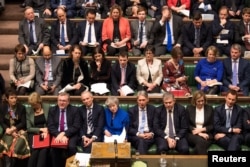European Union leaders are greeting the British parliament's defeat of a hard-reached Brexit plan with a mix of frustration and alarm, even as Europe begins preparing for chances Britain will leave the bloc in just over two months without a withdrawal agreement.
If British lawmakers' resounding "no" to the Brexit deal negotiated between Brussels and the British government comes as no surprise, European politicians — like their British counterparts — are now faced with a major question: what's next?
"We know what the UK parliament doesn't want," the European Parliament's chief Brexit representative, Guy Verhofstadt, told reporters. "Now it's time to find out what they want."
"What we don't want," he added, "is that this mess in British politics is now transferred and imported in European politics."
British Prime Minister Theresa May is now expected back in the Belgian capital for more Brexit talks. But she may not get very far. After nearly 18 months of negotiations, EU leaders are unlikely to make any major new concessions.
"We'll see," French President Emmanuel Macron told local officials. "Maybe we can improve one or two points, but I doubt it."
German Chancellor Angela Merkel says there's still time for more talks, but she also warned it was time to prepare for a "disorderly" or no-deal Brexit.
Larissa Brunner, a junior policy analyst at the European Policy Center in Brussels, said a no deal now certainly is seen as "a strong possibility."
That's the message sounding in the private sector as well. French employers' union MEDEF says companies must prepare for the worst-case scenario. France's wine and spirits industry is braced for a major loss in business with Britain.
"I think a hard, no-deal Brexit would be catastrophic both for the EU and the UK," Brunner said. "And I think it's pretty much impossible to prepare perfectly for it in the time that is left."
Only the stock markets seem unfazed — for now.
Another big unknown is the fate of Britain's EU lawmakers. European Parliament elections are in May, and it's possible the fate of Brexit may still be up in the air.


